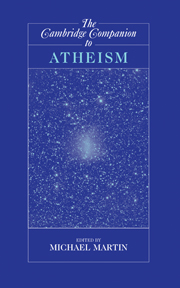Book contents
- Frontmatter
- General Introduction
- Part I Background
- Part II The Case against Theism
- Part III Implications
- 13 Atheism and Religion
- 14 Feminism and Atheism
- 15 Atheism and the Freedom of Religion
- 16 Atheism, A/theology, and the Postmodern Condition
- 17 Anthropological Theories of Religion
- 18 Atheists: A Psychological Profile
- Index
- Series List
15 - Atheism and the Freedom of Religion
from Part III - Implications
Published online by Cambridge University Press: 28 January 2007
- Frontmatter
- General Introduction
- Part I Background
- Part II The Case against Theism
- Part III Implications
- 13 Atheism and Religion
- 14 Feminism and Atheism
- 15 Atheism and the Freedom of Religion
- 16 Atheism, A/theology, and the Postmodern Condition
- 17 Anthropological Theories of Religion
- 18 Atheists: A Psychological Profile
- Index
- Series List
Summary
The legal protection of religious liberty has become an increasingly common phenomenon during the last century. The growth of religious liberty can be linked to the development of modern political theories organized around the concept of constitutional democracy. These theories combine the traditional democratic emphasis on popular control of government with an elaborate constitutional framework. This framework is characterized by structural limits on the exercise of governmental power, the development and protection of civil society, guarantees of personal privacy, and the legal protection of a broad range of individual civil liberties. A comprehensive version of this theory has been articulated and applied by the U.S. Supreme Court since World War II. More recently, variations on this theory have become primary features of the domestic constitutional systems of countries comprising the European Union and in the development of the constitutional structure governing the union as a whole.
A central theme of modern theories of constitutional democracy is that certain aspects of private belief, expression, and behavior are placed beyond the government's control. Religious belief and practice are quintessential examples of activities that are protected by this presumption that citizens are intellectually and spiritually autonomous. Democratic governments are therefore required to leave matters of faith and religious observance to private individuals and their voluntary associations. Likewise, modern theories of constitutional democracy prohibit governments from overtly or subtly coercing religious belief by granting benefits or imposing sanctions or punishments based on the nature of an individual's religious faith.
- Type
- Chapter
- Information
- The Cambridge Companion to Atheism , pp. 250 - 266Publisher: Cambridge University PressPrint publication year: 2006
- 2
- Cited by

